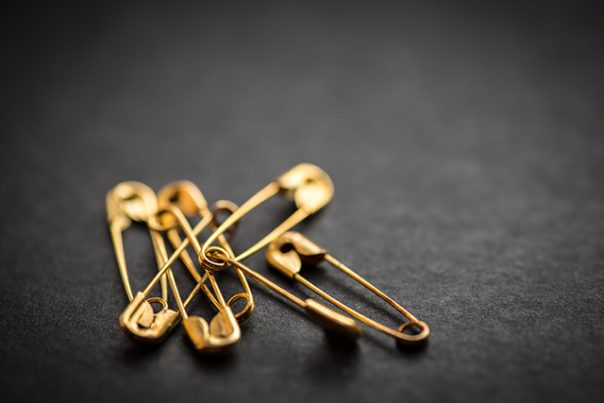Safety pins: 10 uses that make them a must-have for your bug-out bag
Sunday, July 15, 2018 by Jhoanna Robinson
http://www.bugout.news/2018-07-15-10-uses-for-your-safety-pins.html

Safety pins may seem like small, insignificant items; but they actually have a myriad of uses. It’s very handy to always have them on your person, especially safety pins of all shapes and sizes. Safety pins are awesome in the sense that they’re very versatile. Here are some of the things that you can do with safety pins:
- Probe tool (medical use) – If you’re going to use a safety pin to remove metal, wood splinter, or other kinds of foreign debris in an arm or a leg, make sure you properly sterilize the safety pin that you’re going to use. Do that by burning the end of it for around 10 seconds with a lighter or a match. If you can dip the pin in alcohol before it comes into contact with your wound, all the better.
- Suture substitute – You can also use a safety pin to suture a wound if it’s a bad bleeder. However, make sure that you immediately seek medical attention after having done so to avoid potential infection.
- Temporary repair fasteners for clothing or slippers – It’s incredibly irritating when you’re out in the open and suddenly a button on your shorts snaps, or if your flip flops suddenly break. The situation can be easily remedied with a safety pin. Simply push the pin through the plastic stem or through the linings of your shorts and fasten it. It won’t work for a long time, but it can help until you get a new pair of sandals or a new pair of shorts.
- For threading a drawstring – By attaching one end of a safety pin to one end of the drawstring, you can feed a drawstring back through a pajama waist.
- Lockpick or as a tool to secure your keys – If you’re going somewhere where you plan to do a lot of physical activity, say, an amusement park, and you have your keys in your pocket, and you’re afraid of losing them during that rollercoaster ride, don’t fret. Use safety pins to attach your keys to the inside of your pocket. You can also use safety pins to pick the lock of your house if by some terrible fate you still lost your keys.
- Support (individual or as a chain) – Make a chain of safety pins to hang an intravenous (IV) bag.
- Bandage/dressing support – Use it to secure bandages and dressings.
- For increasing the shelf-life of products in a sachet – Don’t tear open or even snip the corner of packet samples of ointments, creams, or lotions. Opt to poke a hole in one side of the pack with a safety pin, so that the products would come out sparingly, thus increasing their shelf-life.
- Lance – You can also use a safety pin to lance a bad wound and allow the pus to ooze forth.
- Toothpick/minor dental first-aid tool – Be careful not to prick your gums when using a safety pin as a toothpick. Also, make sure that you use a sterilized safety pin.
Place your set of safety pins in an area where you can get to them easily. If you’re fond of hats, lodge four to six of them in your hatband, so they can be within reach. Make it a point to bring a set with you all the time.
This is what we try to teach preppers: Take ordinary, everyday items and find more than one use for them aside from their intended purpose, as we never know when they would come in handy during an SHTF situation. (Related: 18 low-cost REPAIR items preppers are stockpiling to keep things running once the civil war begins.)
For more tips on how to handle things when SHTF, visit Preparedness.news.
Sources include:
Tagged Under: Tags: bandage, bug out, bug out bag, bug-out tips, dressing, lockpick, prepping, safety pins, survival, suture

